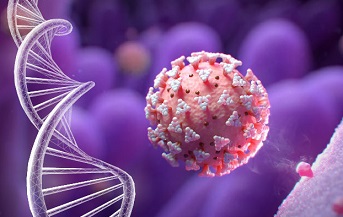BREAKING NEWS! Even Asymptomatic SARS-CoV-2 Infections Cause DNA Methylation And Epigenetic Changes, Leading to Immune Dysregulation!
COVID-19 News - DNA Methylation - Asymptomatic SARS-CoV-2 Infections Jun 10, 2023 2 years, 6 months, 1 week, 2 days, 23 hours, 45 minutes ago
COVID-19 News: A recent study conducted by a collaboration of prestigious institutions including the University of Pittsburgh, Icahn School of Medicine at Mount Sinai, Flatiron Institute, Princeton University, and the Naval Medical Research Center has uncovered a stunning discovery. Contrary to previous assumptions, even individuals with asymptomatic SARS-CoV-2 infections experience significant DNA methylation and epigenetic alterations, which can lead to immune dysregulation and potential long-term health consequences.

Previous
COVID-19 News coverages had also already shown that SARS-CoV-2 can lead to DNA methylation and also epigenetic changes. However, till now, there were no studies done to assess if they occurred in asymptomatic infections as well.
https://www.thailandmedical.news/news/breaking-u-s-study-finds-that-sars-cov-2-infections-and-mrna-jabs-alter-dna-methylation-states-of-immune-cells-and-epigenetic-clocks-of-humans
https://www.thailandmedical.news/news/breaking-covid-19-news-sars-cov-2-infections-lead-to-cellular-m6a-rna-methylation-loss-in-host-cells-possible-implications-for-cancer-and-other-issues
https://www.thailandmedical.news/news/breaking-swedish-study-shows-that-sars-cov-2-causes-epigenetic-changes-to-various-genes-in-human-host
https://www.thailandmedical.news/news/breaking-us-scientists-find-that-covid-19-leaves-lasting-epigenetic-footprint-that-results-in-long-term-immune-dysregulation
https://www.thailandmedical.news/news/long-covid-news-sars-cov-2-infections-causes-epigenetic-changes-that-contributes-to-health-issues-seen-in-long-covid
https://www.thailandmedical.news/news/breaking-brazil-study-involving-detailed-epitranscriptomic-analysis-shockingly-reveals-that-sars-cov-2-alters-rna-of-infected-host-cells
https://www.thailandmedical.news/news/international-stu
dy-finds-that-sars-cov-2-causes-epigenetic-changes-and-transcriptomic-reprogramming-in-monocytes-of-covid-19-patients
https://www.thailandmedical.news/news/even-mild-and-moderate-sars-cov-2-infections-causes-transcriptional-reprogramming-of-the-host-s-cd14-monocytes-resulting-in-dysfunctional-monocytes
https://www.thailandmedical.news/news/breaking-singapore-study-uncovers-that-sars-cov-2-alters-human-host-rna-to-improve-viral-fitness
https://www.thailandmedical.news/news/university-of-pennsylvania-study-finds-that-sars-cov-2-uses-histone-mimicry-to-disrupt-host-epigenetic-regulation-for-disarming-host-immune-responses
https://www.thailandmedical.news/news/new-study-by-cornell-university-shows-sars-cov-2-causes-epigenetic-changes-to-innate-immune-cells-and-their-progenitors,-contributing-to-long-covid
https://www.thailandmedical.news/news/breaking-university-of-texas-study-discovers-that-sars-cov-2-alters-human-host-chromatin-complex-to-cause-immune-dysfunction
DNA methylation, which records lifetime exposures and interacts with genetically determined markers, has long been associated with various diseases. However, little was known about the effects of acute perturbations like infections on methylation dynamics in humans. This study aimed to shed light on the temporal trajectory of epigenetic remodeling following asymptomatic and mildly symptomatic SARS-CoV-2 infections in young adults.
The study team closely monitored 133 participants throughout the course of their infections, analyzing blood samples collected before, during, and after the infections. Surprisingly, they found that the differential methylation caused by asymptomatic and mildly symptomatic infections was indistinguishable. While gene expression largely returned to normal after the virus became undetectable, some differentially methylated sites persisted for months, resembling patterns seen in autoimmune or inflammatory diseases.
Leveraging these findings, the study team developed machine learning models based on methylation data, capable of accurately distinguishing between pre-infection, during-infection, and post-infection samples. Not only did these models classify the timing of infection, but they also predicted the clinical trajectory of young adults and a diverse cohort with more severe outcomes. Strikingly, the presence of a post-infection-like methylation state prior to subsequent SARS-CoV-2 infection was found to be anti-protective, unlike the phenomenon of trained immunity.
This research provides profound insights into the long-term effects of disease associations related to SARS-CoV-2 infection. The study demonstrates that both symptomatic and asymptomatic infections induce methylation changes that may persist longer than gene expression changes. Furthermore, the complex dynamics of methylation alterations can be harnessed to predict the timing of infection.
These findings have far-reaching implications for our understanding of COVID-19 and the broader field of epigenetics. They suggest that an individual's DNA methylation pattern holds valuable information about their exposure history and can potentially be used as a biomarker for disease risk assessment. Moreover, the study raises important questions about the long-term consequences of SARS-CoV-2-induced methylation changes and their impact on overall health.
The study team cautions that further investigation is needed to explore the functional effects of these methylation changes beyond the study's duration.
However, the implications are significant, as similar increased infection risks have been observed following other primary infections, such as measles.
Understanding the dysregulated epigenetic state caused by SARS-CoV-2 infection may pave the way for targeted interventions and personalized treatment strategies to mitigate the long-term health effects of the virus.
This groundbreaking study not only highlights the intricate interplay between viral infections and our epigenetic landscape but also underscores the importance of understanding the broader implications of SARS-CoV-2 infection beyond its acute phase. As we continue to battle the COVID-19 pandemic, these study findings provide invaluable insights that could shape our approach to both the current crisis and future infectious diseases.
The study findings were published in the peer reviewed journal: Molecular Systems Biology. (EMPOpress)
https://www.embopress.org/doi/full/10.15252/msb.202211361
For the latest
COVID-19 News, keep on logging to Thailand Medical News.
Read Also:
https://www.thailandmedical.news/news/south-african-study-finds-that-covid-19-leads-to-epigenetic-changes-in-host-immune-genes-which-can-be-prevented-or-reversed-by-vitamin-d
